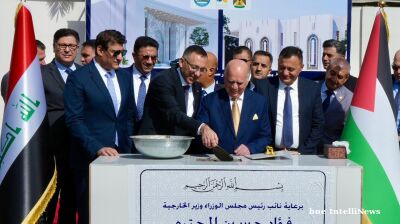The Kremlin wants to ban any Rosneft shareholder like BP from making any deals with any other minority shareholders ahead of the upcoming privatization of a big stake in Russia’s biggest oil producer.
The government intends to sell a stake on the order of 20% in the country's largest oil producer to help raise the planned RUB 1 trillion from its renewed privatization programme. The government is expected to end this year with a deficit of about 4% of GDP or about RUB1.5 trillion.
The issue at hand is control of Rosneft, which is a 'stoligarch' company and so is as much a political beast as a revenue generator for the government.
The government currently owns 69.5% of the company while BP controls another 19.75%, so as much as 19.5% of Rosneft could be put on the block worth an estimated $10.5bn (about a third of what is needed to plug the budget deficit hole). The state intends to retain control via its 100% control of the holding Rosneftegas that holds the government’s stake.
However, the Kremlin seems keen to prevent BP from joining forces with any potential incoming strategic investor, which would give them the power to block government decisions.
“We believe it wishes to avoid BP and the new strategic investor combining their efforts to oppose the government’s decisions. While this clause might dent the attractiveness of Rosneft’s stake to some extent, we deem the news neutral for Rosneft shares,” Aton Capital said in a note.
There are already several restrictions on the sale of the stake. On July 18, First Deputy Prime Minister Igor Shuvalov signed a directive with the following requirements for potential investors:
• A lock-up period of three years.
• Obligation to vote for government candidates to the Board of Directors.
• The potential investor(s) should not have any pending debts or tax liabilities to the budget of Russia.
• Confirmation that the combination of the investor’s assets and the assets of Rosneft will have the potential for synergies.
• Investor must minimise conflicts of interest and regulatory risks from third countries.
On August 5, Minister for Economic Development Alexey Ulyukaev said that the privatisation of Rosneft might not happen in 2016.
News

Bill Gates makes surprise Indian TV debut
In a move set to spark both intrigue and curiosity, Microsoft co-founder and philanthropist Bill Gates has made a cameo appearance on Indian television, entering the iconic drama series Kyunki Saas Bhi Kabhi Bahu Thi 2.

Queen Sirikit of Thailand dies
The death of Queen Sirikit of Thailand has marked the end of an era for the Thai monarchy. According to an official statement from the Bureau of the Royal Household of Thailand, Her Majesty died at 9.21 pm on October 24.

Pakistan, the latest in Asia to see gold prices plummet
In international trading, the precious metal lost $35 per ounce to settle around $4,115, extending a week-long slide triggered by shifting expectations over US monetary policy.
_1761305900.jpg)
Latin America edges up growth forecasts but remains trapped in low gear, ECLAC says
Latin America and the Caribbean will expand 2.4% this year, the Economic Commission for Latin America and the Caribbean said, marking the second upward revision since April but pointing to the region's struggle to escape chronically weak growth.




